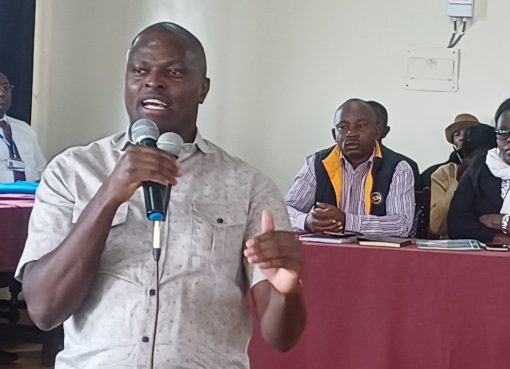The media serves as a platform for farmers to tell their stories, experiences and challenges, making their voices to be heard, thus transforming the food system and security in the country.
Agriculture Principal Secretary (PS) Kipronoh Ronoh has stated that the government wants the media to focus on stories about farmers and the overall agricultural sector in a bid to raise awareness about the critical role the sector plays in the Kenyan economy.
Ronoh noted that the agricultural sector contributes 21 percent of Kenya’s GDP and employs over 40 percent of the population, highlighting its critical role in the country’s economic food system transformation.
Moreover, the PS said the media plays a vital role in reporting farmer’s stories by providing a platform to share their experiences, challenges and successes, ultimately contributing to the development of the key sector and the well-being of farming communities.
Speaking during a media breakfast on Kenya National Food Systems in Nairobi, the PS said this push aims to heighten the sector’s importance, showcase government efforts to support farmers and promote positive narratives about farming by showcasing success stories and the benefits of modern agricultural practices.
“The government urges the media to engage with farmers. By amplifying farmer voices, the media can influence policies, educate the public and promote innovative practices like kitchen gardens that promote nutritional value in our families,” he said.
The PS said by covering farmer’s stories, the media can help the government address some of the challenges farmers face in the sector such as lack of access to credit and finances, agricultural inputs like fertilizer, infrastructure, and fair prices among others.
“I urge the media to go to the villages and communities and tell stories of people on the ground,” he said, adding that real stories of farmers, their challenges and experiences, will help the government put in place the right measures.
Ronoh opined that the media can connect farmers with researchers, policy makers and other stakeholders, fostering collaboration and knowledge leading to effective solutions to agricultural challenges.
“The government is actively involved in supporting farmers through various programs, including provision of fertilizer, seeds and technical assistance,” he said, adding that they are working to improve infrastructure, such as rural roads to facilitate the movement of produce.
The PS divulged that media organizations have the responsibility to deliver factual and unbiased information, free from political and institutional influences ensuring that agriculture stories are reported accurately.
“Let us tell the true stories about our farmers’ experiences and about our nation regarding our agriculture position,” he said, adding that that true stories can change the food system in our country.
Ronoh said that the media can also play a vital role in dissemination of information about government initiatives such as the digitization of farmers’ records, subsidize fertilizer programmes, provision of planting seeds among others.
“Let us go beyond boardroom discussions. The media seeks to promote positive narratives about farming, showcasing success stories and the benefits of modern agricultural practices, and the struggles faced by farmers,” he said.
Ronoh lauded the media for their commitment in telling farmers and agricultural sectors stories, thus making the Ministry visible by the many positive stories they tell Kenyans on what takes place in terms of realities.
“It is therefore important to appreciate the media,” he said, adding that they have made farmers and the community know that issues to do with food come first, and that the various programmes that the government is promoting on food security are working.
The PS also said Kenya is currently hosting the National UN Food Systems Summit together with partners, under the theme, ‘Fostering Collaboration, Innovation, and Inclusion for Resilient Food Systems,’ at a Nairobi hotel.
He said the Summit will showcase how the government is driving transformative change in its food system through five strategic pathways aiming to digitizing agricultural practices, improving dietary diversity, empowering youth and women in agribusiness, promoting climate resilient farming and ensuring financial inclusion for farmers through partnerships and collaboration.
The two-day summit from April 14 -15, 2025 kicks off ahead of the second United Nations Food Systems Summit Stock take (UNFAA+4) that will be taking place in Addis Ababa, Ethiopia in July, this year.
By Anita Omwenga





